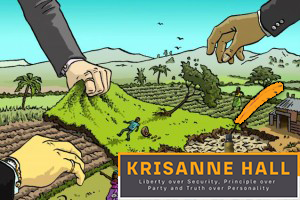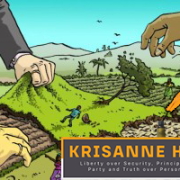Government Land Grabs, Regulations Equal Theft
Government Land Grabs, Regulations Equal Theft
by KrisAnne Hall, JD
Government land grabs are becoming more and more prevalent every day. The federal government is seizing up more and more private land under the auspices of environmental preservation and national parks. We are even seeing the military taking private land and calling it national security. This federal tyranny is trickling down and infecting our local governments, as well.
Our framers believed that the Right to secure property was vital to the preservation of Liberty. Under what circumstances can the government legally and constitutionally take our land?

From John Locke, the father of our understanding of Natural Law, in his “II Treaties”:
“The Supream Power cannot take from any Man any part of his Property without his own consent. For the preservation of Property being the end (purpose) of Government, and that for which Men enter into Society….
For I have truly no Property in that, which another can by right take from me, when he pleases, against my consent. Hence it is a mistake to think, that the Supream or Legislative Power of any Commonwealth, can do what it will, and dispose of the Estates of the Subject arbitrarily, or take any part of them at pleasure…
For a Man’s Property is not at all secure… if he who commands those Subjects, have Power to take from any private Man, what part he pleases of his Property, and use and dispose of it as he thinks good.”
We have an inherent Right to acquire, possess, and secure private property. That doesn’t mean that the government has a duty to provide all people with property. It means that we have the Right to acquire it without government control and permission and once we acquire it, we have the Right to possess it and protect it. The entire purpose for establishing government is to collectively protect the inherent Rights of the individual.
“That to secure these Rights governments are instituted among men deriving their just powers from the consent of the governed.” Declaration of Independence
To accept that the government can operate contrary to its entire purpose, by taking those Rights instead of protecting them, Locke calls that a “gross absurdity” and the creators of our Constitutional Republic would whole heartedly agree.
“[Property] in its particular application means “that dominion which one man claims and exercises over the external things of the world, in exclusion of every other individual.”
That means, once something is called “your property” you hold all rights, privileges, and control over that property- to the EXCLUSION of ALL others; including government. Madison would explain to you, and all members of government, that includes an exclusion from government possession, control, and regulations! It is government’s sole responsibility to secure the rights and properties of the people.
Locke’s principle of the inherent Right to acquire and possess land is reaffirmed by the Supreme Court in 1795:
“From these passages, it is evident, that the right of acquiring and possessing property, and having it protected, is one of the natural, inherent and inalienable rights of man. Men have a sense of property: property is necessary to their subsistence, and correspondent to their natural wants and desires; its security was one of the objects that induced them to unite in society. No man could become a member of a community, in which he could not enjoy the fruits of his honest labor and industry. The preservation of property, then, is a primary object of the social compact…” Vanhorne’s Lessee v. Dorrance, US, 1795.
The government should not arbitrarily take property from the people. Arbitrary taking is a clear violation of the Constitution and as the Supreme Court so eloquently states, it is contrary to the primary object of government. But not only that, James Madison explains that arbitrary taking of private property is the mark of an “unjust government”, an act of “complete despotism:”
“That is not a just government, nor is property secure under it, where the property which a man has in his personal safety and personal liberty, is violated by arbitrary seizures of one class of citizens for the service of the rest.” James Madison, Property, 1792
Madison’s assessment of a “just government” ought to be the goal of all American government, on the local, State, and federal levels. But that will not happen until the American people begin to understand that government control and regulations are the antithesis of Liberty not means to secure safety and security.
“That is not a just government, nor is property secure under it, where arbitrary restrictions, exemptions… deny to part of its citizens that free use of their faculties, and free choice of their occupations, which not only constitute their property in the general sense of the word; but are the means of acquiring property strictly so called.” Property, Madison, 1792
The principle of the inherent Right to possess is embodied in the 5th & 7th Amendments to the Constitution when it declares that “No person shall… be deprived of life, liberty, or property, without due process of law; nor shall private property be taken for public use, without just compensation.”
Notice the three restricting elements: due process, public use, just compensation. How do we determine what is adequate due process and what is just compensation? According to contract law, the law that is controlling over the interpretation of the Constitution, we must look to the framers of the Constitution for guidance. Alexander Hamilton says,
“It is there declared that, no man shall be disfranchised or deprived of any right, but by due process of law, or the judgment of his peers. The words “due process” have a precise technical import, and are only applicable to the process and proceedings of the courts of justice; they can never be referred to an act of legislature.” Alexander Hamilton, Remarks on an Act for Regulating Elections, New York Assembly, 6 Feb. 1795
Due process is an act of the courts of justice, not an act of the legislature. It is not within the delegated power of the legislature to pass a law that takes your land, the legislature’s only power is to negotiate a settlement with the land owner. When that negotiation fails, any taking must be facilitated through the courts via proper application of due process. How must that be done?
“In Suits at common law, where the value in controversy shall exceed twenty dollars, the right of trial by jury shall be preserved, and no fact tried by a jury, shall be otherwise re-examined in any Court of the United States, than according to the rules of the common law.” – 7th Amendment
When the government attempts to take any property valued at more than $20, due process means a trial by jury of our peers. This means that private property should not be a legislative act. Private property should not be taken by a single judge, or even a tribunal of judges. Private property should not be taken by an executive agency.
The Supreme Court in 1795 believed that if the federal government could take land from private land owners outside limited constitutional parameters, that government would, “display the dangerous nature of unlimited authority; it would [be] an exercise of power and not of right. Such an act would be a monster in legislation and shock all mankind…
It is inconsistent with the principles of reason, justice and moral rectitude; it is incompatible with the comfort, peace and happiness of mankind; it is contrary to the principles of social alliance, in every free government; and lastly, it is contrary both to the letter and spirit of the constitution. In short, it is what every one would think unreasonable and unjust in his own case.”
James Madison made a plea, in 1792, to the people of America and for future generations:
“Where an excess of power prevails, property of no sort is duly respected…If the United States mean to obtain or deserve the full praise due to wise and just governments, they will equally respect the rights of property, and the property in rights: they will rival the government that most sacredly guards the former; and by repelling its example in violating the latter, will make themselves a pattern to that and all other governments.”
When government makes restrictions, regulations, exemptions for the property you call your own, that is a taking of that property on multiple levels. They courts may argue that if the government is “only” regulating a “small portion” of the property that this taking is justified for the “greater good.” Not only do the creators of America disagree, but all of Liberty disavows such heresy. That is socialism and is incompatible with the actions of a Constitutional Republic and people who ought to be dedicated to Liberty.
The overriding principle for al government must be, as Madison said, “This being the end of government, that alone is a just government, which impartially secures to every man, whatever is his own.” Government must protect the rights of all people to act freely upon their own property, “impartially-“ whether those in government like that person or their property. The very definition of property relies upon the owner being free to use that property within his exclusive dominion. When a person does not have exclusive dominion over their property they cannot rightly claim ownership. unfortunately, that is the condition of the majority of people in America. We are not property owners, we merely lease our property through taxation and permission from those in government, we are simply indentured servants to the government plantation owners.
The truth of this history and logic ought to ignite and inspire all Americans to change the reality of their governments, because the change is within our authority and within our power. We must begin to educate ourselves and others on the errant operations of our governments and go about making real and powerful efforts to effectuate change… beginning from the bottom up. If we refuse city councils, county commissions, and State taking of our property, we will eventually become educated and united enough to limit federal power as well. If we continue to make excuses or blindly throw our efforts into a “federal first” mentality, nothing will ever change and the only think our children will inherit is oppression.
So I ask you, do we have a just government? Does our government deserve the full praise due to wise governments? Do our legislatures, courts, and governors equally respect the rights of property and the property in rights? This is our real litmus and this is one of the ways that history and posterity will judge America.


